UCT all-rounder celebrated for inclusivity work
25 October 2019 | Story Carla Bernardo. Photo Evan Zerf. Read time 7 min.
Hlumelo Marepula really can do it all. The University of Cape Town (UCT) student is a final-year civil engineering student and will begin working towards her masterʼs in water quality engineering in 2020.
She is also a member of the Cape Town Youth Choir, and was named as the winner of the Falling Walls Lab in Cape Town earlier this year. This means she will soon travel to Berlin to compete against 99 other global finalists. Falling Walls Lab is an international forum for outstanding young innovators and creative thinkers in all fields, whether science, technology or medicine.
And if Marepula needed anything else to prove what a go-getter and all-rounder she is, the UCT+ Award she received recently for her service to the university community should be ample evidence.
UCT’s Office for Inclusivity and Change (OIC) recently hosted a thank-you dinner, which included the UCT+ Awards ceremony, for the university’s volunteer Agents of Change Education (ACEs). This is a peer education programme run by the OIC.
Students apply to become peer educators and are trained during the year-long programme to deliver workshops on campus and in the student residences, to educate their peers in the intersectional areas of HIV, gender, sexual and gender-based violence (SGBV), sexual diversity, privilege and class.
At the UCT+ Awards, the volunteer peer educators were ranked according to the number of hours of service they dedicated to building inclusivity on campus. There were bronze, silver and gold awards and Marepula, who managed over 60 hours of service, earned a gold award.
We caught up with her to find out about her ACE work.
CB: Why did you become an ACE?
HM: In all honesty, what attracted me to this opportunity at first was the promise of a UCT+ Award. Then, going into it, I started to realise the impact of the work that we do. One of the things we continue to promote around the university space is inclusivity. In other words, we aim to create an environment on campus that allows people to express themselves fully without being marginalised.
CB: What does training to be an ACE entail and who runs it?
HM: We attended regular training sessions, usually on a Saturday for four hours. These training sessions were held by the programme director, Stella Musungu. The purpose of the training was to give us insight into the different issues we would need to discuss in the workshops. They included roleplaying and how to handle difficult conversations. We were also given outlines of how we could run a workshop but had the freedom to run these as we saw fit.
“I believe we can have our beliefs but they should never infringe on the rights of someone else to exist.”
CB: What have been the lows and the highs of the workshops you facilitated?
HM: The common issue that I encountered when hosting workshops was that “the problem isnʼt in the room”. For example, I would advertise an SGBV and rape culture workshop, and the majority of the attendees would be womxn who have experienced such violence. The purpose of the workshops is to educate, and if those who need education are not in the room, it becomes almost useless. However, I did find that in those spaces where the “problem was not in the room”, the space turned into one where womxn could voice their concerns and find solace.
CB: Who attended these workshops?
HM: The workshops were open to all members of the university community. We hosted many of them during Orientation Week for the incoming first-years, and ran most of them in residences throughout the year. Various societies around campus also called on us to host workshops for their members. ACEs were also encouraged to host workshops with a group of friends, family members, church groups and everyone they encountered.
CB: Why is it important to talk about these issues?
HM: There is a surprisingly large [number] of people who navigate the university space with their own ideals and beliefs, and feel justified to marginalise or harm someone else based on that. I believe we can have our beliefs but they should never infringe on the rights of someone else to exist. For example, someone being gay doesnʼt affect you in any way so why spend all your energy marginalising someone for being themselves?
CB: Would you encourage other students to become ACEs?
HM: As an ACE, there is a lot to learn about a range of different issues, and there is a lot to learn about yourself too. You meet people from different backgrounds who hold different views and your world perspective is broadened as a result. You become more open-minded and open-mindedness allows room for deeper engagement. You start to have more meaningful conversations and you become better for it. One thing I developed more than anything else as an ACE is empathy.
CB: Finally, what is the plan going forward concerning your training and service?
HM: Since Iʼll be doing my masterʼs next year, I plan on rejoining the programme. Now that Iʼve mastered my facilitation skills (pun intended), I feel more confident in my ability to create meaningful change in the university space, one workshop at a time.
- Other UCT+ Awards went to Mapiti Daniel, Dana Parker, Lesego Letshwiti, Yandisa Mtsewu, Sikelela Ketsiwe, Abonga Dube, Takunda Mwanza, Kudzanayi Rusimo, Pearl Mchunu, Bongeka Goba in the gold category; and Petronella Ncube, Jamain Heesom, Nigel Munyoro, Itumeleng Sethlabane, Motlatsi Monyake, Blondy Ntombodidi, Sekhesa Mokhantso, Buso Ntombodidi, Wandile Mngadi, Phelokazi Mphalampela, Ridgwell Nunu, Lindokuhle Madondo, Buhle Yalezo, Bulelani Nkupane, Phophi Mamidzani in the silver category.
 This work is licensed under a Creative Commons Attribution-NoDerivatives 4.0 International License.
This work is licensed under a Creative Commons Attribution-NoDerivatives 4.0 International License.
Please view the republishing articles page for more information.










